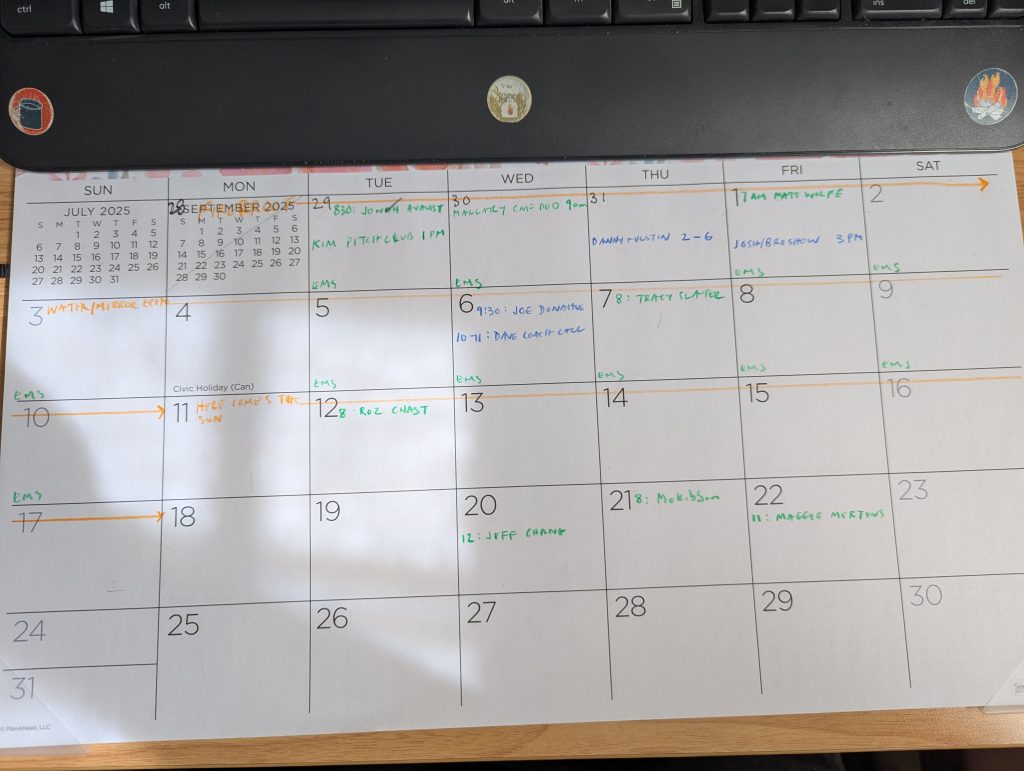
I love a digital calendar. I love having that shit in hand. Reminders. Gimme all the reminders. But what I love more than a digital calendar is redundancy in the form of a paper desk calendar.
Continue reading “Let Us Now Praise Paper Calendars”
I love a digital calendar. I love having that shit in hand. Reminders. Gimme all the reminders. But what I love more than a digital calendar is redundancy in the form of a paper desk calendar.
Continue reading “Let Us Now Praise Paper Calendars”View on Zencastr
Listen on Apple Podcasts, Spotify, YouTube, or wherever!
Hey CNFers, The Front Runner is officially out. I like to think I don’t ask for much, but now is the time buy a copy or three and, if you read it, you know the drill, need ratings and reviews. I won’t read them because I don’t want to be driven insane, but that’s the world we live in: ratings and reviews. Your call to action to support the book, me, and ye ol’ CNF Pod. If you’re still on the fence, and why would you be, there’s an excerpt of the book over at Lit Hub. Dig it.
Next two events are July 27 at Gratitude Brewing for a live taping of the podcast, 1 p.m. and July 31 at Laurelwood Golf Course from 3-6 p.m.
I also started what’s proving to be a pretty popular venture called Pitch Club. It’s at welcometopitchclub.substack.com and I have a writer audio annotate a pitch. It’s tactical and it’s practical. It’s going to help you get where you want to go.
“Yeah, join the club of people who feel inadequate.” — Dana Jeri Maier, a cartoonist and author of the graphic book on creativity Skip to the Fun Parts.
Continue reading “Episode 480: Dana Jeri Maier Doesn’t Trust Anyone with a Neat Desk”Listen on Apple Podcasts, Spotify, YouTube, or wherever!
Hey CNFers, The Front Runner is officially out. I like to think I don’t ask for much, but now is the time buy a copy or three and, if you read it, you know the drill, need ratings and reviews. I won’t read them because I don’t want to be driven insane, but that’s the world we live in: ratings and reviews. Your call to action to support the book, me, and ye ol’ CNF Pod. If you’re still on the fence, and why would you be, there’s an excerpt of the book over at Lit Hub. Dig it.
Next two events are July 27 at Gratitude Brewing for a live taping of the podcast, 1 p.m. and July 31 at Laurelwood Golf Course from 3-6 p.m.
I also started what’s proving to be a pretty popular venture called Pitch Club. It’s at welcometopitchclub.substack.com and I have a writer audio annotate a pitch. It’s tactical and it’s practical. It’s going to help you get where you want to go.
“What is this genre if not hybridity, and hybridity is constantly mutating.” — Jeff Sharlet
Continue reading “Episode 479: Jeff Sharlet and Finding Real Toads in Imaginary Gardens”
photo “courtesy” of CNN.com
Become a Patron!This is the way.
The Mandalorian and his kind live by a simple code, always punctuated by saying “This is the way.”
What codes do you live by? What codes were you at one time or another TOLD to live by? Do you admire codes and singular devotion, or do you feel unfairly shackled to a way of life? Has a code led you to the right path or down the wrong? Capt. Fantastic (“Power to the people. Stick it to the man.”) lived by a code, but it put his several children at odds with the world and nearly paralyzed one child.
Essays should be no longer than 2,000 words (a 15-minute read, bear in mind that, in the end, these are audio essays. Write accordingly.). Email submissions with CODE in the subject line to creativenonfictionpodcast at gmail dot com. Original, previously unpublished work only, please. Oh, and I pay $25 per accepted essay. It’s not much, but you can buy a couple burritos with it.
There is cash on the line, so send me your best, fully formed pieces and consider becoming a patron to help put money in the coffers that helps put money in the pockets of writers.
DEADLINE: Oct. 31, 2025
Simultaneous submissions are fine, but if your piece is accepted elsewhere or you’re holding out for a more “prestigious” publication, please let me know ASAP as I read these essays very closely and even give rejected essays detailed notes for improvement.
This is the way.
Listen on Apple Podcasts, Spotify, YouTube, or wherever!
Hey CNFers, The Front Runner is officially out. I like to think I don’t ask for much, but now is the time buy a copy or three and, if you read it, you know the drill, need ratings and reviews. I won’t read them because I don’t want to be driven insane, but that’s the world we live in: ratings and reviews. Your call to action to support the book, me, and ye ol’ CNF Pod. If you’re still on the fence, and why would you be, there’s an excerpt of the book over at Lit Hub. Dig it.
Next two events are July 17 at Elliott Bay Books in Seattle at 7 p.m. and July 27 at Gratitude Brewing for a live taping of the podcast, 1 p.m.
I also started what’s proving to be a pretty popular venture called Pitch Club. It’s at welcometopitchclub.substack.com and I have a writer audio annotate a pitch. It’s tactical and it’s practical. It’s going to help you get where you want to go.
“I don’t have to state too baldly what that all means. And because I think part of it is that I’m incapable of stating things like that baldly. I’m not smart enough. I lack the language and the real rhetorical muscle to state things baldly. I’d rather not hit it on the nose, because I have bad aim.” — Nick Paumgarten, staff writer for The New Yorker
Continue reading “Episode 478: Nick Paumgarten says, ‘The Reporting Suggests the Root System’”Become a Patron!View on Zencastr
Listen on Apple Podcasts, Spotify, YouTube, or wherever!
Hey CNFers, The Front Runner is officially out. I like to think I don’t ask for much, but now is the time buy a copy or three and, if you read it, you know the drill, need ratings and reviews. I won’t read them because I don’t want to be driven insane, but that’s the world we live in: ratings and reviews. Your call to action to support the book, me, and ye ol’ CNF Pod. If you’re still on the fence, and why would you be, there’s an excerpt of the book over at Lit Hub. Dig it.
Next two events are July 17 at Elliott Bay Books in Seattle at 7 p.m. and July 27 at Gratitude Brewing for a live taping of the podcast, 1 p.m.
I also started what’s proving to be a pretty popular venture called Pitch Club. It’s at welcometopitchclub.substack.com and I have a writer audio annotate a pitch. It’s tactical and it’s practical. It’s going to help you get where you want to go.
“If nothing else, it says a lot about chasing a story even when you don’t have an assignment, because Dave had reported this entire thing before he even pitched it to us.” — Jonah Ogles, lead editor of “Conversations with a Hit Man.”
Continue reading “Episode 477: David Howard and the Search for Stories He Believes In”Listen on Apple Podcasts, Spotify, YouTube, or wherever!
Hey CNFers, The Front Runner is officially out. I like to think I don’t ask for much, but now is the time buy a copy or three and, if you read it, you know the drill, need ratings and reviews. I won’t read them because I don’t want to be driven insane, but that’s the world we live in: ratings and reviews. Your call to action to support the book, me, and ye ol’ CNF Pod. If you’re still on the fence, and why would you be, there’s an excerpt of the book over at Lit Hub. Dig it.
I also started what’s proving to be a pretty popular venture called Pitch Club. It’s at welcometopitchclub.substack.com and I have a writer audio annotate a pitch. It’s tactical and it’s practical. It’s going to help you get where you want to go.
“I always say, with pitches, make it as easy for an editor to say yes as possible.” — Amanda Heckert, executive editor of Garden & Gun Magazine
Continue reading “Episde 476: Amanda Heckert Helps the Rider Stay on the Horse”Listen on Apple Podcasts, Spotify, YouTube, or wherever!
Hey CNFers, The Front Runner is officially out. I like to think I don’t ask for much, but now is the time buy a copy or three and, if you read it, you know the drill, need ratings and reviews. I won’t read them because I don’t want to be driven insane, but that’s the world we live in: ratings and reviews. Your call to action to support the book, me, and ye ol’ CNF Pod. If you’re still on the fence, and why would you be, there’s an excerpt of the book over at Lit Hub. Dig it.
I also started what’s proving to be a pretty popular venture called Pitch Club. It’s at welcometopitchclub.substack.com and I have a writer audio annotate a pitch. It’s tactical and it’s practical. It’s going to help you get where you want to go.
Continue reading “Episode 475: For Dane Huckelbridge, Spacing Out is Part of the Process”Listen on Apple Podcasts, Spotify, YouTube, or wherever!
Hey CNFers, The Front Runner is officially out. I like to think I don’t ask for much, but now is the time buy a copy or three and, if you read it, you know the drill, need ratings and reviews. I won’t read them because I don’t want to be driven insane, but that’s the world we live in: ratings and reviews. Your call to action to support the book, me, and ye ol’ CNF Pod. If you’re still on the fence, and why would you be, there’s an excerpt of the book over at Lit Hub. Dig it.
I also started what’s proving to be a pretty popular venture called Pitch Club. It’s at welcometopitchclub.substack.com and I have a writer audio annotate a pitch. It’s tactical and it’s practical. It’s going to help you get where you want to go.
“There is this myth that you are a writer only if you are butt in chair, banging away at your keyboard for eight hours and then the rest of the time on a fainting couch somewhere, noodling over your ideas. And that kind of imagery does a lot of damage to young writers today.” — Yi Shun Lai
Continue reading “Episode 474: How to Reconfigure the Fireworks with Yi Shun Lai”Listen on Apple Podcasts, Spotify, YouTube, or wherever!
“It’s like trying on clothes when you’re a young writer, early in your career, you’re constantly trying to figure out who you are.” — Hampton Sides, Ep. 473
Continue reading “Episode 473: Finding the Frame with Hampton Sides”